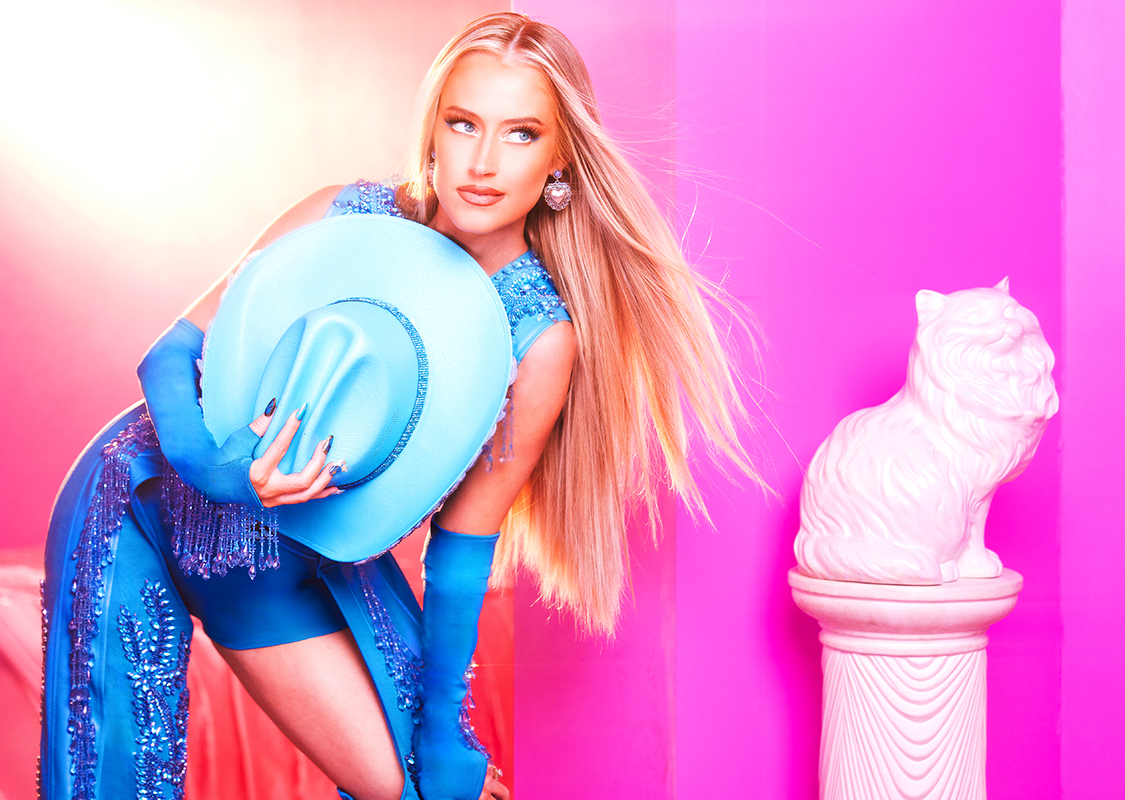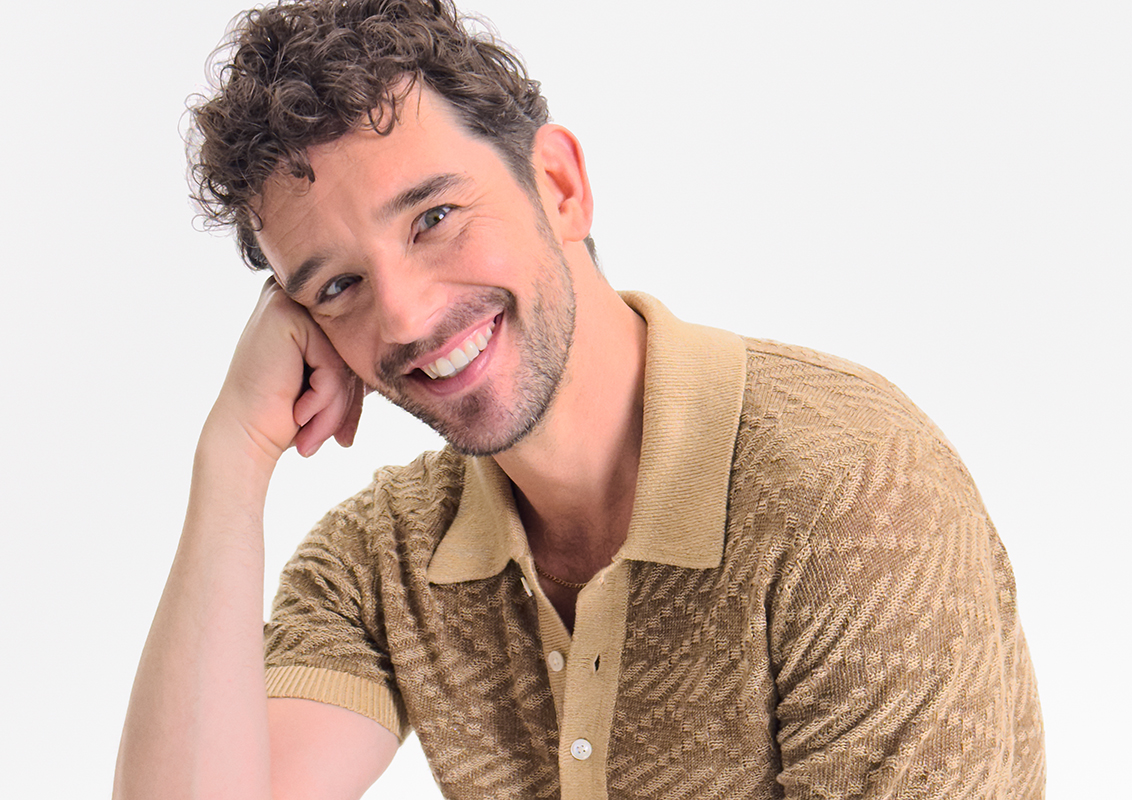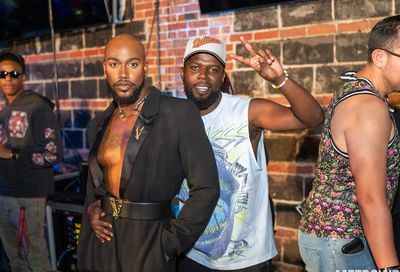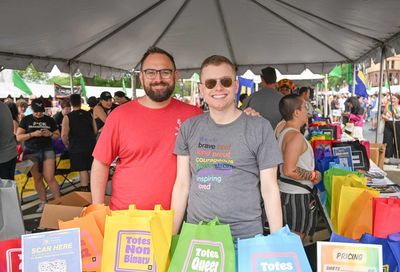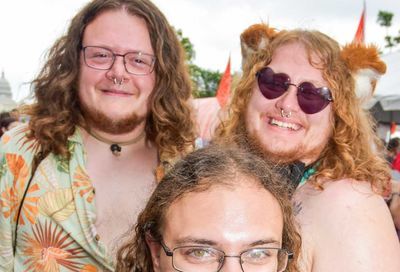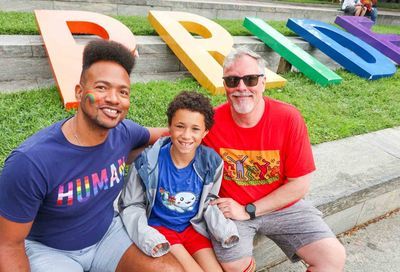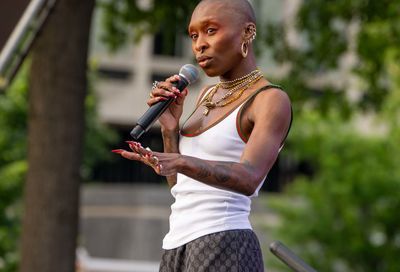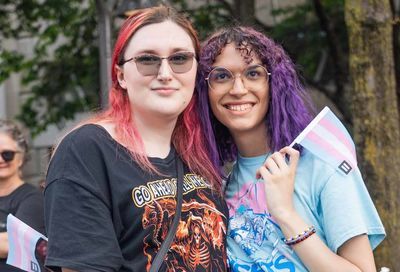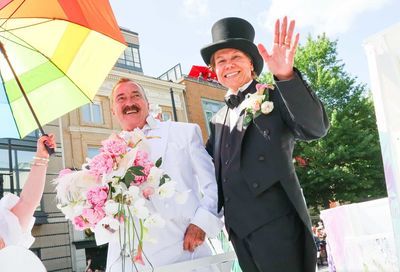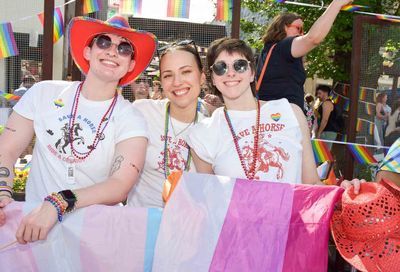Gold Rush
When she's not milking the room for laughs, comic Judy Gold juggles a career, two kids and her 85-year-old Jewish mother
”Oh, goddammit, fuckhead ass!”
Judy Gold’s phone won’t stop making loud bleeping noises. And it’s getting on her nerves. And the one thing you don’t want to do is get on Judy Gold’s nerves.
She picks it up and mock hurls it across the room before tossing it haphazardly onto the DCJCC conference-room table and resuming her answer to my question.
”Now, what was I saying?”
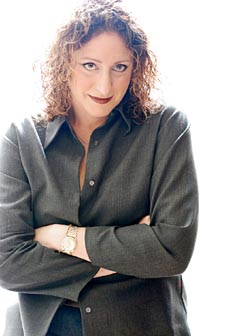
The phone bleeps furiously.
”Oh, shut the fuck up!” she screams. And then, into the tape recorder, she says softly, politely, ”Sorry, Mrs. Shulman, I was talking to my phone.”
Gold apologizes to my own Jewish mother repeatedly throughout the interview — generally whenever she lets loose a loud, garrulous string of profanities, which is often — as she’s been informed that Mrs. Shulman does the interview transcribing for Metro Weekly.
”I feel like your mother is here with me,” she says, mock terror in her big, expressive eyes. ”Just standing there, watching.”
If it’s one thing Judy Gold knows from, it’s Jewish mothers. Apart from being one herself — she has two boys, Henry, 11, and Ben, 6 — she spent the better part of a year interviewing 50 Jewish mothers for her play 25 Questions (for a Jewish Mother), at Theater J through Feb. 24 (see review, page 30). Gold cautions that the show bears little resemblance to her normal stand-up act — it’s a theatrical piece, by turns funny and poignant.
”The show deals with so many issues, it’s really not stand-up comedy at all. One woman even asked me to call her daughter — she’s not talking to her daughter — and make amends for her. I get a lot of letters from Orthodox Jews who are gay and like, ‘My parents disowned me and I miss being a Jew.’ I’ve had people write to me, ‘I brought my parents to your show and then I came out to them afterwards.”’
Loud, brash, and at 6’3” commandingly tall, the 45-year-old has an electric personality that is barely containable. She’s always on — at least during the several hours she spends during an interview and photo session — and obscenely funny. She’s the kind of lesbian every gay man wants around as a gal pal, not to mention, at her size, a bodyguard.
The phone bleeps yet again. This time Gold picks it up and starts text messaging.
”I always think it’s the nurse because Henry is a hypochondriac,” she apologizes, as she text messages furiously, her thumbs blazing with lightning speed. ”Wait! Reply! Shit!”
During a wide-ranging interview, the topic turns, as it often does in Washington, to politics. So, who gets the Gold vote, Hillary or Obama?
”I’m leaning towards Hillary,” she says. ”Only because, well, I hate to say it but I’m sick of men running this country. I really am. I just hate that if she was a guy, no one would be making any comments. They’d be like, ‘Wow, she’s really smart and really knows her stuff and she’s a great debater.’ It would be like she’s far superior. But because she’s a woman….” She pauses. ”But then I like Obama, too. I just can’t decide. I like him, I like his message. I just hate the way he talks. He talks very staccato sometimes.”
Gold then launches onto another topic entirely.
”We went to Annie’s Steakhouse last night!” she exclaims. ”I loved it! It’s the gayest place in the world. The waiter was so gay! He’s walking by our table saying nasty things under his breath. One time he walked by and said, ‘I don’t know, I’m not a mind reader, I’m a waiter.’ He was so funny. I love that place!”
The phone bleeps yet again. Gold glances at the message and a mixture of frustration and concern crosses her brow.
”My goddam mother — she won’t take her medications!” she grunts, exasperated.
Jewish mothers. They have come to define Judy Gold’s world. They’re occasionally a curse — but mostly, as Gold has learned through personal experience, a blessing.

METRO WEEKLY: Let’s start at the beginning of the Judy Gold saga.
JUDY GOLD: [Sings.] Let’s start at the very beginning! [Directly to the tape recorder.] Hi, Mrs. Shulman! Shabbat Shalom!
I was born in Newark, N.J., at Beth Israel Hospital. Is that shocking or what? I grew up in Clark, a central New Jersey suburb, very suburban, and my childhood would be sort of like Welcome to the Doll House. I was 6 feet tall at 13. My mother was from Manhattan, so I knew outside of this [New Jersey] hellhole — I shouldn’t say that because people get so mad when I say it — there was another world. From my bathroom, I could see the lights — I think it might have been Staten Island, but to me it was like Oz — and I’m like, ”I can’t wait to get out of here.” It was not a fun childhood.
MW: Was yours a Jewish neighborhood?
GOLD: We did have a lot of Jews and Italians. There were two sides of the town, the Jew/Italian side and the ”others” — ”goyim.” You know that that’s not a really derogatory term. Goyim means ”everyone else.”
MW: Were you religious?
GOLD: My mother was very observant. She was Conservative but very kosher. We had Shabbos [Sabbath] every Friday night. She wouldn’t do certain things on Saturday. She wouldn’t knit. Knitting is work. But she would drive to synagogue.
MW: Well, it’s an adaptable religion. What about you?
GOLD: When I went to college I was not into religion at all. It was when I had kids that I embraced it. I think religion is the root of all evil, I really do. People who are religious zealots are just out of their minds. But if you can take the good from it and use it to really be a good person, I think it can be very helpful.
Being gay, I have people say to me, ”Are you gay or are you Jewish?” like they’re mutually exclusive. Being gay is who I love, a part of who I am. But being Jewish is all of who I am. It’s my ancestry, how I eat, how I look, how I talk, how I think. Being gay is who I fall in love with.
MW: How did your mother take your coming out?
GOLD: Oh, she was thrilled! My mother was like, ”You know, Judith, I always wanted a lesbian!” What, are you crazy? My mother — it was so weird! We just never talked about it, which is a very Jewish thing. You don’t talk about it and it’s not there. It’s the whole ”pink elephant in the middle of the room” theory. My mother had a pink elephant that we found out about during an interview on Nightline for the book When I Knew, which I’m in. Nightline called and says, ”Look, we want to interview you and one of your parents. We’re doing a segment on this book.” So I said, ”My father is dead so I really don’t think he can make it. But then on second thought, how are your hair and makeup people?” [Laughs.]
I said, ”I don’t really think my mother is going to do it because she is very negative.” And they said, ”Oh, we want negative.” And my mother is like, ”I don’t know why we have to discuss it all the time. I go to the supermarket and they’re all staring at me because of you.” And I’m like, ”Ma, they’re staring at you because you’re in the produce section and your motor scooter is bashing into everyone. They’re staring at you because melons and grapefruits are flying all over the place, not because I’m a lesbian.” So anyway, she said she wouldn’t do it. Then my brother — I don’t know if you’ve heard of him, Jesus Christ — calls. He’s the first-born male and he told her to do the interview, and she did.
On the way to the interview I said to her, ”Ma, I know you hate talking about it but you’re going to have to talk about when did I know about being a lesbian.” She said, ”Let me ask you something, Judith. When did you know?” And I said, ”What? I don’t know, I knew when I was like 5.” And she said, ”I knew before you. When you were 2.” She tells this on national TV. ”You used to run over to the neighbor’s house every night because they had crayons” — because you know, God forbid, she should buy me a fuckin’ box of crayons — ”and every night you’d run over to the neighbor’s house but you had to wear a necktie.” I said, ”What?” And she said, ”Yeah, you’d put on one of your father’s neckties before you left the house.” And I said, ”I’m a cross-dresser 2-year-old and you act surprised when I tell you I’m gay in my 20s?” She said she just put it in the back of her head. She never thought about it. She never talked about it. And the interviewer asked her, ”Do you feel like you’re missing out on anything?” And she says, ”No.” She got grandkids out of the whole deal and I think I’m probably the happiest of her three children.
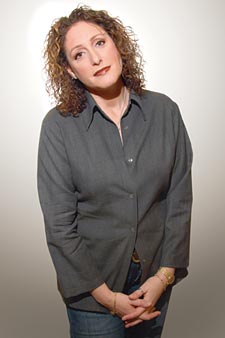
MW: What about your father?
GOLD: He actually called me once when I was about 24 or 25 and said, ”Judith, you dating anyone?” We don’t talk about anything substantive in my family. We could talk about hard-boiled eggs for about an hour and a half on the phone, but nothing of any substantive nature. So I go, ”Dad, what are you talking about?” And I had lived with my now ex-girlfriend Wendy at this point. And he was like, ”Well, do you have a boyfriend?” And I’m like, ”Dad, what are you…?” ”Well, do you have a girlfriend?” It was like 9 in the morning, I was sleeping, I was not prepared, and I said, ”No, I don’t know what you’re talking about.” And he said, ”Just so you know, parents have kids who are gay and bisexual and they still love them.” And I was thinking, ”Oh, my God, here’s my opportunity and I’m completely blowing it.”
MW: When did you start to incorporate being gay into your stand-up?
GOLD: When I started doing stand-up, I was not publicly out and I really didn’t have anything to talk about. A lot of comics would talk about their relationships. Mine was so boring that I just talked about my mother. Then, I don’t know, I started going to Provincetown and performing there. I still didn’t say anything but I didn’t not say anything. After my father died, nothing scared me on stage. So that sort of opened me up….
Also I have to say the biggest part of it [was having children]. I was already out, but having children [reinforced it further]. I wanted them to know that our family is just like everyone else’s, that you can’t be hiding something, you can’t say, ”Listen, don’t say anything to them — they don’t know that you have two moms.” You just can’t do that.
MW: That’s very admirable. There are other celebrities who remain closeted and have kids. We all know who they are. But by staying in the closet, they’re teaching the kids a negative lesson.
GOLD: Right, that we’re not equal, we’re not worthy, we’re not entitled, that we don’t deserve. And it’s just wrong. It’s not true. You look at my older son, Henry, and the word lesbian means nothing [bad] to him, and gay means a person who is gay. It’s so beautiful to see that. Now he’s having a lot of problems in school because the kids say ”fag” and ”gay,” and he says, ”That really offends me. My parents are gay.” And they go, ”Fag, fag, gay, gay.” He hates it.
Cynthia Nixon’s kid goes to Hebrew School with Henry and recently they had a panel about marriage equality at our synagogue. They had a lawyer and a psychologist so they sought from every perspective. These kids of gay parents were [on the panel] and were like ”I have the most awesome family. I have three moms and a dad,” and I’m thinking, Henry is going to have four moms and what if he marries someone with two moms, the kids are going to have six grandmothers! But I dare anyone to look at my children and say they’re missing out on something or lacking something. They have two adult parents who love them. I think it’s those kids who are going to change the world.
MW: As a comic, what’s been more successful for you in terms of developing your persona: Has it been more of the gay side or the Jewish side?
GOLD: I think it’s a combination of both. I’ve never denied that I’m a Jew. I’ve gone to colleges in Alabama and said, ”I’m a Jew” and they’re fine. It was harder for me to be gay on stage because I didn’t want to be known as a gay comic. I wanted to be known as a comic who happens to be gay. And that’s what I think we all want in our lives.
MW: Is it hard to juggle your motherhood with the career?
GOLD: Oh, my God, it’s so difficult. I hate leaving my kids. I feel completely guilty. But they come along with me a lot. And they see that I had a dream and I lived it and I support a family doing what I love. And I’ve exposed them to so much stuff that they have no reaction, which is exactly what I wanted to happen.
MW: The show trades on the Jewish mother experience. What kind of Jewish mother have you been to your kids?
GOLD: [Laughs.] Really annoying. I am a lot like my mother, which is really awful. I say things like ”Can I have five minutes to myself?!” Here’s a good one I did a couple of weeks ago: ”Henry, I hope that you treat your teachers and your friends better then you treat me.” And then I walked out of the room. At that moment, I thought, ”Oh, my God, I am Ruth Gold.” There’s so many ways that I’m like my mother.
MW: When you do something like that do you think to yourself, ”Now I understand why she did it?”
GOLD: Oh, yeah. My younger son Ben is a lot like me [as a kid]. He’ll find something really annoying to do. And I remember I used to love to needle my parents. I’d find something about my mother and I’d do it over and over and Ben does that now, too. I used to be like, ”Why can’t my parents laugh and think this is funny?” And now I realize because they were stressed out and had so much to do and couldn’t get their crap done. So, yeah, you see yourself in a completely different way when you have kids. It’s like you’re re-living your childhood through them.
MW: While more gays than ever are having kids these days, the majority of us still won’t have the parenthood experience. Are we missing something profound in our lives for not having that experience?
GOLD: Well, I don’t know. I don’t want to judge people because having kids is a choice. For some gay people it is not a choice because it’s just too difficult, it takes a lot of money. But I think all people, straight or gay, if you don’t have children, you are missing out on a big part of life. It was my partner who really pushed us to have kids. I probably would have just gone on and on, like, ”Yeah, I’ll wait a while” and then one day been like, ”Oh, I forgot to have kids.” I do think that you can’t really get it unless you have a child. Let me tell you lesbians out there something: Having a cat is not the fucking same thing as having a child, okay?
So yeah, I do think you miss out, but some people don’t want to have kids. But I need someone to wipe my ass in the Hebrew Home for the Aged.
MW: Would you go through the pregnancy again?
GOLD: I loved being pregnant. I felt really feminine and womanly and I had never felt so content emotionally. I felt like my hormones were all in balance and I didn’t need medication. I was just so happy, like ”Wow, nothing’s bothering me.” I’m not picking my cuticles and anxious and screaming at everyone. Here I am, 6’3”, and I have this huge belly, and people are getting up on the subway to let me sit down, mostly women. Guys never get up to let women sit down.
One time I was in line at the bank — I’m about eight months pregnant — and this woman teller says, ”Are you making a deposit, sir?” And I’m like, ”I’m eight months pregnant! What do you think, I have a beer belly?” I mean, it was so weird because for my whole life, I’ve always been treated like, ”She can do it, she can handle it because she’s so big.” You really do get treated differently when you are large. People think you’re older when you’re a kid and you’re just more capable of doing, and it was just kind of nice being pregnant and kind of pathetic. Yes, I’ll sit down on the subway, you fuckin’ asshole.
MW: You know, before meeting you, I didn’t realize you were so tall.
GOLD: Really? You should see my cock!
MW: Well, let’s just leave it at that. You’ve guested on numerous TV shows. Have you ever tried pitching your own sitcom?
GOLD: My goal, I have to tell you, and I’ve been trying to do this for years, is I want to do a family sitcom where it’s a gay family and you’re watching it and thinking, ”Oh, I forgot they were gay.” Because this is all the same crap I deal with. And we have pitched and pitched and I wrote a script that’s just hilarious and people are like, ”It’s not gay enough.” What do you mean? People actually think that gay people get up and they’re like, ”Hey, I’d like to order breakfast and I’m gay!” And ”Yeah, I want scrambled eggs, I’m gay and I’m gonna suck a dick now because I’m gay and I’m attracted to every man!”
Entertainment and comedy are so powerful because you can really change people’s minds and let them see things in a different way. How great would it be for gay teens in Omaha to go, ”I can have kids and I can be married and I can have a life and a family?” It’s like to be able to reach out to them and give them role models. Yes, there are gay characters on TV but they’re so stereotypical.
MW: You should try LOGO.
GOLD: We did. They’re so male-oriented there.
MW: During your interviews with all the Jewish mothers, what was the most stereotypical thing you found they had in common?
GOLD: There were two things: One was if we went to someone’s house to interview them, there was always food, always some huge spread. We gained so much weight. The other thing was that 99 percent of them spoke, e-mailed, had some contact with their children every single day. Every day. One of them was like, ”You know, my daughter lives in Israel and so I have to get up at 2 in the morning to call her before Shabbos.”
MW: Mrs. Shulman is going to get upset when she hears this on the tape — because Mom and I talk about once every 10 days or so.
GOLD: That is just abhorrent. Mrs. Shulman, not good! Do you e-mail?
MW: She e-mails me. I just don’t always respond.
GOLD: Randy, that’s awful. You should talk to her every day. Is your father alive?
MW: Yes.
GOLD: Well, then that’s fine. My mother is a widow. Still, she talked to her mother every day and I talk to her every single day. At least once a day.
MW: So I had a final question for you — but now I don’t remember what it is because we got sidetracked here.
GOLD: That’s because you don’t call your mother enough!
MW: Oy, am I going to hear about this! And Mom, don’t call me until after you’re done transcribing, then you can call me.
GOLD: She probably loves transcribing these interviews.
MW: I think she does.
GOLD: She learns a lot.
MW: When we asked her to do it a few years ago, I was nervous because we address specific personal things sometimes. But it’s been good. Plus, she’s incredibly fast. She’s a typing whiz.
GOLD: Do you pay her?
MW: Yes.
GOLD: [Directly to the recorder.] Well, Mrs. Shulman, we need to discuss your salary.
25 Questions runs through Feb. 24 at Theater J, in the DCJCC, 16th & Q Streets NW. Tickets are $15-$50. Call 800-494-TIXS or visit www.theaterj.org.
Support Metro Weekly’s Journalism
These are challenging times for news organizations. And yet it’s crucial we stay active and provide vital resources and information to both our local readers and the world. So won’t you please take a moment and consider supporting Metro Weekly with a membership? For as little as $5 a month, you can help ensure Metro Weekly magazine and MetroWeekly.com remain free, viable resources as we provide the best, most diverse, culturally-resonant LGBTQ coverage in both the D.C. region and around the world. Memberships come with exclusive perks and discounts, your own personal digital delivery of each week’s magazine (and an archive), access to our Member's Lounge when it launches this fall, and exclusive members-only items like Metro Weekly Membership Mugs and Tote Bags! Check out all our membership levels here and please join us today!









